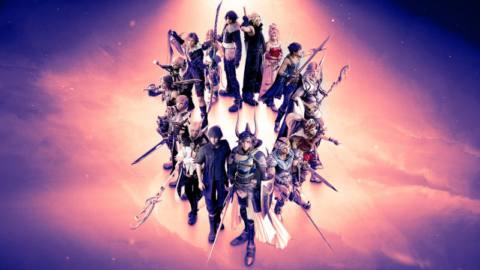
Platform: PlayStation 5, PC
Publisher: Square Enix
Final Fantasy is a staple in JRPGs and video games as a whole. It might have more entries in it than any other series out there and it won’t be slowing down anytime soon. On top of that, thanks to its anthology-like nature, if one Final Fantasy game doesn’t click for you, there’s a good chance another one will. As a result, ranking the Final Fantasy series can be highly contentious. Everyone has a lot of love for the first entry they played, and then there are heavy hitters like Final Fantasy X and VII, too.
However, the staff here at Game Informer did the seemingly impossible: we ranked all 19 mainline numbered Final Fantasy games, including their direct sequels, from worst to best. As a reminder, this ranking is the sum of collective thoughts of the Game Informer staff and your own personal ranking will almost certainly be different. We’d love to know your ranking, though, so after checking out ours, drop your own in the comments below!
19
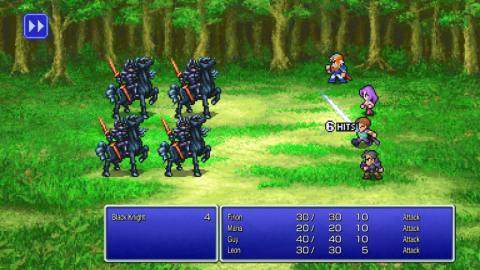
Final Fantasy II
There’s an argument to be made that none of the mainline Final Fantasy games are outright bad. However, in any ranked games list, there has to be a game at the bottom and putting Final Fantasy II here was an easy call. It wasn’t released in the West until years later, and by then, the Final Fantasy franchise had moved on to bigger and better things, which made it hard to return to the series’ first sequel.
What’s there isn’t inherently bad, but it’s certainly strange. Unlike Final Fantasy, you aren’t earning overall experience that levels up your character’s stats across the board. Instead, your individual traits like HP, Magic, Stamina, and more, improve based on the actions you actually take in battle. It’s interesting, sure, but it’s more cumbersome and confusing than it is fun. Unfortunately, since combat is core to the game, the leveling system really bogs it down. That its story is unremarkable on top of that makes Final Fantasy II hard to recommend to anyone lacking a passionate interest in the franchise’s history, but the recent Pixel Remaster does make playing through it much easier.
18
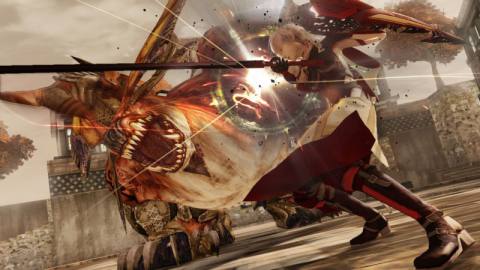
Lightning Returns: Final Fantasy XIII
Lightning Returns: Final Fantasy XIII, for all its faults, is special, though perhaps not in the way Square Enix wanted. The only threequel in the series, Lightning Returns is a look at how far Square Enix can stretch the universe of a mainline Final Fantasy. Dropping the party-based combat of the previous entries with a mostly solo Lightning experience, you’re tasked with saving as many people as you can before the world ends. As a result, Lightning Returns is played to the backdrop of a highly divisive mechanic that puts a clock on everything you do.
If time runs out, you’re essentially put through New Game Plus, which has you restart the game with all of your current stats. That can be quite annoying, especially if you screw things up in the final hour. Ultimately, though, Lightning Returns fails to make a largely positive impression. It drops some of the highlights of the XIII universe, like XIII-2’s monster collection and crystarium, and adds in mechanics the series didn’t need. Its story is just as nonsensical as its predecessor and Lightning is at her weakest in this entry. It’s hard to recommend Lightning Returns to anybody as a result, save for hardcore fans of the XIII world, but even then, they’re sure to be disappointed by drastic changes to gameplay and mechanics, and a weaker presentation of the series’ main protagonist. | Our Review
17
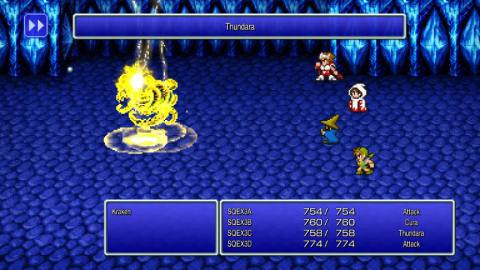
Final Fantasy III
Often mistaken for Final Fantasy VI and forgotten here in the states as a result of it not hitting the U.S. until many years later when it was remade for the Nintendo DS, Final Fantasy III is less a good game worth playing and more a textbook on staples of the Final Fantasy franchise. Its story and world is forgettable, but its combat is completely serviceable. At its worst, it’s the most skip-worthy Final Fantasy game in the franchise. At its best, it’s the game that laid the foundation for systems, mechanics, and more that we’d come to really love in later entries.
16
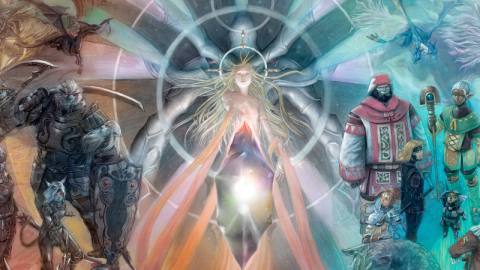
Final Fantasy XI
Square Enix made a big bet with taking Final Fantasy to the MMO space in 2002, and for early adopters, it mostly paid off. Final Fantasy XI invited fans to explore Vana’diel, a vast world where players could create a unique character, choose from a variety of classes, and group up with friends and others through the power of the internet to take on quests, dungeons, and other dangers of the world together for the first time.
In just a few short years, other MMOs like the genre dominating World of Warcraft, and much later, Final Fantasy XIV, would come along with exceptional improvements in approachability and plenty of quality of life changes XI just could never muster in its updates over the years. Those who want to still venture into Vana’diel can, though! XI is still very much active and available 20 years after its initial launch.
15
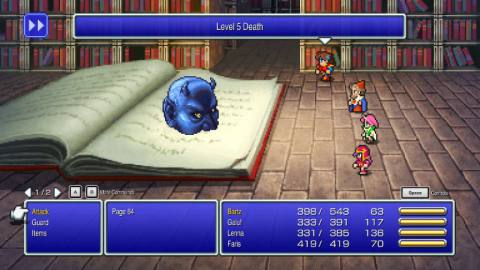
Final Fantasy V
Final Fantasy V falls between two beloved Final Fantasy entries – IV and VI – that many see as some of the best in the series. Unfortunately, that means Final Fantasy V is often forgotten. It also means it’s closer to the bottom of this list than it is to the top, but don’t count this one out because its job system is one of the franchise’s best. Building off of the more basic version of role swapping first introduced in Final Fantasy III, V’s jobs opens up the game’s RPG systems in ways not previously seen in the series, and we’re not just saying that because of the ridiculous combos you can create with it. The job system’s flexibility really lends itself well to making each party member feel like a character you’ve personally crafted and molded.
Beyond the job system, which is easily (and rightfully) the main selling point of Final Fantasy V, this game’s soundtrack rips. Plus, its softer story is refreshing compared to the world-ending calamities often seen in JRPGs and even other Final Fantasy titles. Often forgotten, Final Fantasy V deserves your time at some point in your gaming journey (perhaps via the new Pixel Remaster of it). It won’t blow your socks off like others on this list, but you’ll roll credits satisfied you played through this 1992 classic.
14

Final Fantasy
Final Fantasy is not a bad game by any means, but in a series with dozens of entries, it’s also not the best or even one of the better titles in the franchise. However, credit where credit’s due: it began the Final Fantasy franchise, and for that reason, it deserves some love.
The story is straightforward yet barebones – although Team Ninja was somehow able to spin one of the edgiest Final Fantasy games out of it in Stranger of Paradise: Final Fantasy Origin – and it lacks today’s quality of life features (many of which were added in the pixel remaster, fortunately), but at its core is a foundational combat system that would evolve and inspire Final Fantasy games for decades to come. Hell, in a way, it practically wrote the dictionary for JRPG combat (with some help from Dungeons & Dragons, of course). Today, Final Fantasy might not be the one younger players are pining to replay, but it’s an essential part of video game history and always will be.
13
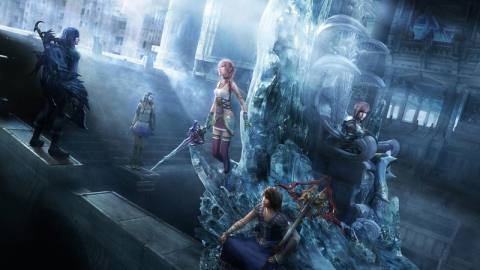
Final Fantasy XIII-2
Final Fantasy XIII-2 is regarded by some as the solution to XIII’s problems, but of course, that depends on what you view as problems in the original Fabula Nova Crystallis entry. If you wanted more wide-open spaces, improvements to the already-great combat system of XIII, and more information regarding some of XIII’s narratively weaker characters – like Serah – then you’re going to really like XIII-2. If you wanted a better story than that of XIII, prepare for disappointment because XIII-2’s plot is nonsensical at best and absolutely bonkers at worst. However, when you get past the change in the pace of exploration and the off-the-wall time travel story, you’re treated to another fun, albeit weaker, entry in the universe of XIII. That there’s a monster hunting side activity to switch things up when you need a break from standard combat and narrative progression makes XIII-2 even more unique.
At its core, XIII-2 is a fine game. It’s a lesson in developers perhaps listening a little too much to feedback and criticism, to the point where it can clash with what fans of the first game really liked, but it’s an interesting rare sequel in the Final Fantasy franchise that we’re happy exists. Plus, the music, like that of XIII, still absolutely slaps. | Our Review
12
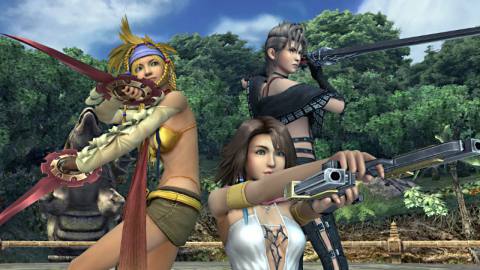
Final Fantasy X-2
X-2 may not reach the lofty heights of its phenomenal predecessor, but it’s a solid and somewhat underappreciated gem. Watching Yuna, Rikku, and Paine fight to keep Spira’s factions from dragging the nation into a civil war while also searching for Tidus were compelling hooks that had their share of cool moments. Yes, the dresspheres are thematically silly, but it was a goofy way of presenting a superior version of Final Fantasy X’s already excellent battle system. We’d be remiss not to mention the music, too, as X-2 provided memorable bangers like “Real Emotion” and “1000 Words”. | Our Review (HD Remaster)
11
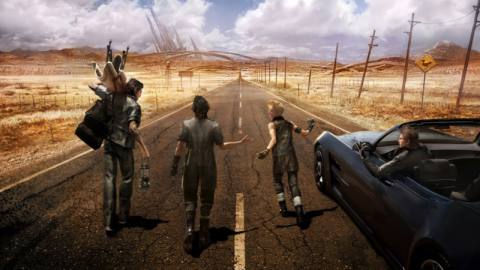
Final Fantasy XV
The hype surrounding XV’s release was palpable. Originally titled “Versus XIII,” XV not only built upon the Fabula Nova Crystallis series of games that the XIII Trilogy established, but it also served as the next evolutionary step for Final Fantasy with the implementation of a next-gen open world (not to be confused with XII’s hub-centric open world). Noctis, Prompto, Gladiolus, and Ignis weren’t a particularly riveting bunch, but their road trip through Eos’ verdant landscapes was filled with a plethora of fun interactions, from real-time battles with Astral Summons to cooking over a campfire beneath a sky full of stars.
Final Fantasy XV is just shy of top-10 nirvana because of its repetitive action loop, confounding plot (especially during its mid to final hours), and unremarkable side quests. Even so, XV’s frenetic combat system and gorgeous environments would undoubtedly influence future Final Fantasy projects. | Our Review
10
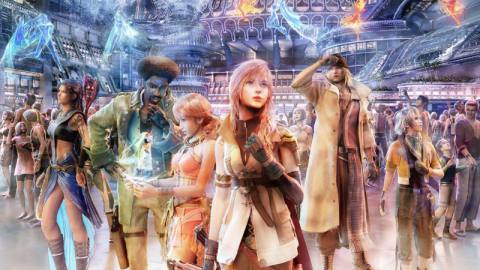
Final Fantasy XIII
Final Fantasy XIII is the black sheep of the franchise in many ways. Fan reception at release wasn’t stellar – especially compared to the hype around it – and many disliked its more hallway-like linearity and lack of openness (until much later in the game). However, once you strap in, you’re in for a treat. Featuring a cast of great female leads, some male leads that nicely complement the story of this game’s women, and one of the series’ best combat systems, Final Fantasy XIII deserves more love than it gets. Its combat, which is focused on finding weaknesses to stagger enemies, is fresh, and it’s such a wide swing in the opposite direction of the excellent (but highly divisive) combat of its predecessor that you can’t help but admire it.
The story can be pretty nonsensical in an overarching sense, but the individual stories of each character showcase series high depictions of romance, fatherhood, sibling love, and more, all further enhanced by an excellent voice cast. And don’t you worry, we didn’t forget about what is easily the best aspect of Final Fantasy XIII, and that’s the music. Masashi Hamauzu did to Final Fantasy XIII what Phil Collins did to Disney’s Tarzan: created a masterpiece when nobody expected it. From “The Promise”, which weaves in and out of the story in both explosive and tender ways, to battle themes like “Blinded By Light”, and the all-time bop, “The Sunleth Waterscape”, Final Fantasy XIII’s score is still one we’re jamming to today. | Our Review
9
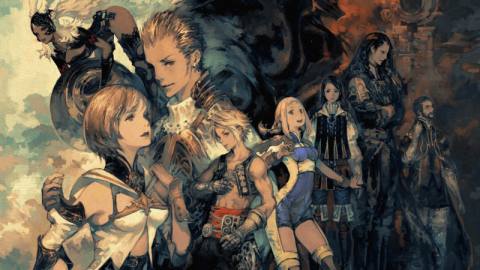
Final Fantasy XII
Final Fantasy XII doesn’t get enough credit. Despite its critical and commercial success, XII often flies under the radar when compared to other Square Enix blockbusters. Nevertheless, it’s a love letter to sweeping epics with ensemble casts, gorgeous metropolises coupled with wartorn setpieces, politics marred by dire conspiracies, and, most importantly, magic. An expansive assortment of bosses – flaming ponies, tyrannosauruses, and mechanized aircraft to name a few – and meandering dungeons give XII’s open world an impressive sense of scale and depth.
From a gameplay perspective, XII’s gambit system allowed players to customize the behaviors of their party members and added nuance to enemy engagement, non-randomized encounters (adversaries were visible in the overworld) made each explorable location feel alive, and a dynamic camera would go on to inspire the real-time combat in XV and VII Remake. If you haven’t played XII yet, Zodiac Age is the definitive remaster that implements myriad quality of life changes alongside a job-based progression system. | Our Review (The Zodiac Age)
8
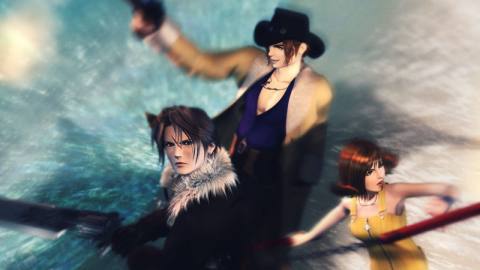
Final Fantasy VIII
Arguably the most divisive Final Fantasy of the PlayStation era, Final Fantasy VIII is easily the most daring of the three. Following the exploits of mercenary students known as SeeDs from Balamb Garden, angsty teen Squall and his crew find themselves wrapped up in an ancient sorceress’s plot to warp the fabric of time and space. Their journey takes them to the brink of life and death, explores the past through clever flashbacks, and makes players question the reality of the events taking place. Featuring incredible cinematic summons known as Guardian Forces and the entertaining trading card game Triple Triad, Final Fantasy VIII was a spectacle to behold with a vast world to explore and vibrant characters to team up with and grow attached to.
However, VIII’s most controversial component is its junction system, which allows magic spells to be equipped to boost specific character stats. These spells also act like items stored in the inventory, forgoing the use of MP, and have to be “drawn” from special areas on the map or directly from enemies in battle. That means using a spell junctioned to a character will reduce whichever stat it’s supposed to be boosting. Tying these consumable spells to player power is a risk/reward system that some either love or hate, and at the end of the day, holds Final Fantasy VIII from joining the upper echelon of the series.
7
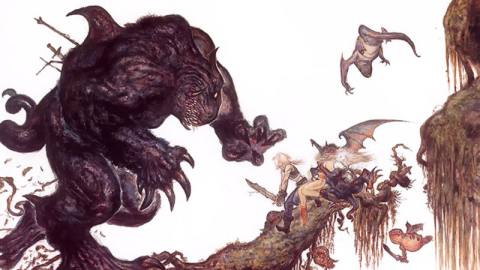
Final Fantasy IX
As a smart blend of classic themes and new-school design, the ninth entry manages to appease two generations of fans while standing on its own merits. We loved exploring Alexandria as Zidane, Garnet, and the crew with the black mage Vivi unexpectedly stealing the show as one of the franchise’s best characters. Combat is arguably the strongest of the PS1 trilogy of games, and the ability system made obtaining and swapping out gear more exciting than ever. IX concludes what many fans consider the golden era of the franchise, and it does so on a high note.
6
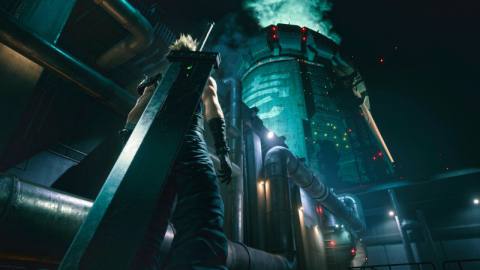
Final Fantasy VII Remake
Midgar is back with a new-gen sheen! Remake was one of our favorite games of 2020 and for good reason; Square Enix made smart changes to VII without sacrificing the novelties of the original. Fully-rendered characters and environments, remastered music, VO/ambiance that gave a voice to the cast and the sprawling cityscape they inhabit – these are but a few new features that modernized and amplified the magic of VII. Better yet, a real-time combat system brought players closer to the action than ever before and made iconic weapons like the Buster Sword and Tifa’s rock-solid fists feel unique and powerful.
Perhaps the most ambitious aspect to Remake is its narrative. Stopping Sephiroth and Shinra remains the primary objective. However, vital changes to the game’s finale and a swath of fleshed-out peripheral characters, as well as new ones, might mean that Remake’s unfinished story will branch off in interesting and unexpected ways. | Our Review
5
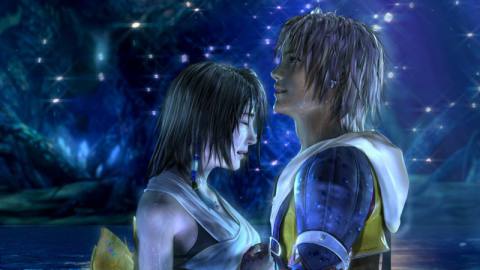
Final Fantasy X
Final Fantasy X was a revolution in many ways. As the first entry with full voice-acting, it makes the most of it by telling an engrossing and often tear-jerking tale of heroes overcoming ancient destroyers and burdensome cultural traditions while finding love throughout it all. X’s revamped battle system made confrontations faster and more engaging, and the Sphere Grid set an exciting new standard in freeform character progression. Tidus may be a dork, but he’s balanced out by the relationships with his endearing allies like the kind-hearted Yuna and the too-cool-for-school Auron. Decades later, we’re as eager to dodge lightning bolts, climb Mt. Gagazet, and sob uncontrollably at the ending as we were in 2001. | Our Review
4
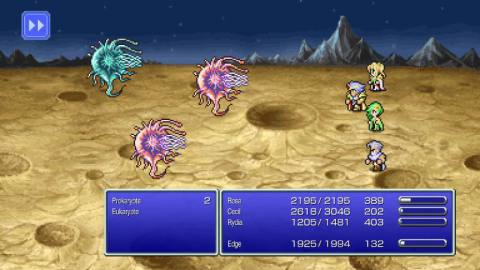
Final Fantasy IV
At a time when RPG stories were threadbare or even nonexistent, Final Fantasy IV set the stage for what would go on to be the bar to beat for the next generation of RPGs. There’s raw emotion in many of the encounters and scenarios that occur in Final Fantasy IV that may seem unbelievably simplistic and cliche today, but were quite moving when games had a lot less to work with in terms of narrative setups and development. Much like the swap to PlayStation’s new hardware helped make Final Fantasy VII a hit, the Super Famicom/SNES let the series look stunning with a fresh look compared to its NES predecessors. In addition, the active-time-battle system added additional tension to classic turn-based combat.
Characters like Cecil, Kain, Rydia, Golbez, and more would go on to represent character classes and archetypes for ages. Huge fights against challenging elemental bosses were immortalized with Nobuo Uematsu’s “Battle With the Four Fiends”, with an unforgettable journey culminating in an epic endgame moon dungeon. Side content journeys to find hidden summon spells and special gear accentuate a traditional story of good vs. evil. | Our Review (Complete Collection)
3
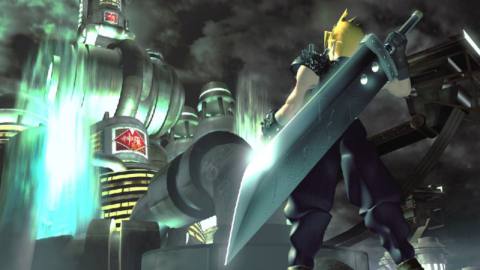
Final Fantasy VII
Where would Final Fantasy be without its monumental seventh entry? The first game in the series to employ FMV and 3D graphics, VII ushered in a new era for emotional storytelling and immersive world-building. Memorable character designs – from Sephiroth’s silver hair and impossibly long masamune to Barret’s bulky build and arm cannon – helped solidify Cloud and co. as the poster children for the entire franchise. Resounding, prevalent themes like political corruption, ecoactivism, mental illness, and survivor’s guilt added narrative texture to VII’s already-impressive dieselpunk, dystopic world. Even Square’s conventional turn-based combat was amplified by cutting-edge art direction and Nobuo Uematsu’s timeless score. Final Fantasy VII is arguably the most influential and lasting installment on the list.
2
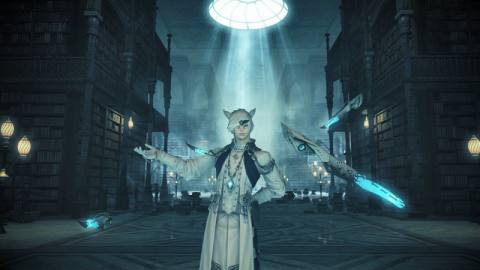
Final Fantasy XIV
Easily one of the biggest success stories in all of gaming, Final Fantasy XIV transformed from an absolute trainwreck in its first iteration to what is now one of the most popular MMOs and highly regarded installments in the series. Since its 2.0 update, A Realm Reborn, developers at Square Enix’s Business Unit III have lovingly crafted a complex and engaging narrative filled with memorable characters and clever callbacks to almost every entry in the Final Fantasy series.
XIV, as it stands today, is a love letter to the franchise that has blazed its own distinct trail and story that stands on its own as one of the series’ best. Sure, its an MMO at heart, but much of it can be played and enjoyed solo. If you have friends to quest with, though, there are hundreds of hours of delight to share. That flexibility has gone a long way to invite more people to play and experience the trials and tribulations of the Warrior of Light and the Scions of the Seventh Dawn, as they strive to unite the nations of Eorzea and the rest of the world. It may be the most daunting modern Final Fantasy to dive into, but it’s undoubtedly the most rewarding and exciting entry in the last two decades. | Our Review
1
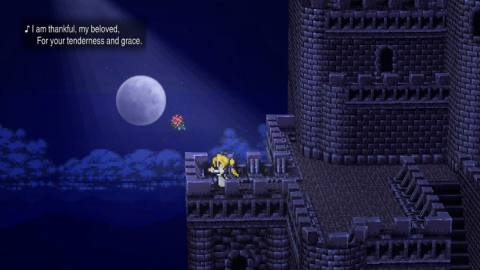
Final Fantasy VI
Final Fantasy VI is not only the best entry in the series, but it remains one of the greatest role-playing games, period. An amazing (and large) cast, a great protagonist in Terra, an even better villain in Kefka, superb music, and a fantastic story boasting several “best of gaming” moments – VI has it all. The combat holds up as a pinnacle of old-school turn-based gameplay steeped with customization and depth. In particular, transforming into Espers to wipe out Magitek suits and soldiers is a satisfying power trip. Final Fantasy VI leaves us conflicted because it’s a game we desperately want to see remade with the reverence and care that Final Fantasy VII received. At the same time, we hope Square never touches it as it’s perfect as is.
